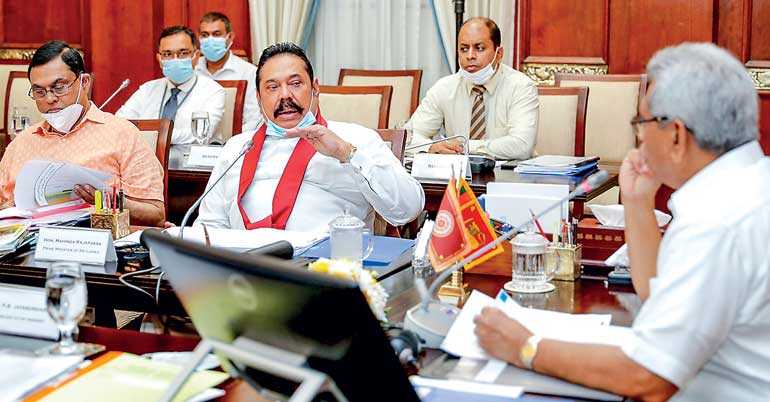Wednesday Feb 25, 2026
Wednesday Feb 25, 2026
Tuesday, 1 September 2020 00:40 - - {{hitsCtrl.values.hits}}

Prime Minister Mahinda Rajapaksa speaks as President Gotabaya Rajapaksa listens and Head of Presidential Task Force in charge of Economic Revival and Poverty Eradication Basil Rajapaksa checks a file during the meeting of the Cabinet Sub-Committee on Cost of Living yesterday
President Gotabaya Rajapaksa said yesterday that there would be no reversal in the Government decision to restrict import of turmeric and other such items.
“The step we have taken forward will not be taken back. By firmly sticking to the policy measures that have been taken, the cost of living will be reduced,” the President told the inaugural meeting with members of the Cabinet Sub-Committee on Cost of Living (COL) which he chairs.
“Due to the restriction on imports, prices of turmeric and some other items have gone up but if these measures are eased, the objective of developing cloak agriculture and helping the farmers can never be achieved,” the President said, adding that despite the short-term inconveniences consumers face, the measures taken to strengthen rural agriculture will not be reversed. At the meeting, the COL Committee discussed at length how the middle-class urban dwellers are being impacted by the rise in the cost of certain essential items.
“Around 40% who make up the rural farming communities must be assured of a regular income with a stable marketplace in the country for their produce. If this is not done, there is no way to encourage the farmers and hence lifting restrictions on imports is not viable,” he said.
The President said that this will help save foreign exchange and lessen the debt burden in the country, and pointed out that both the US and India have imposed restrictions on imports in the wake of the COVID-19 pandemic.
He said that as part of the poverty alleviation program undertaken by the Government, around 100,000 members of low-income families will be given employment while home gardening, poultry farming will also be encouraged.
“The development of rural agriculture and the increase in the income of these communities should go hand in hand with the decrease in the cost of living of middle-class urban dwellers,” he added.
The need for proper procedures to address the issues faced by the middle-class in the suburbs due to inflation was also emphasised. Following the COVID-19 pandemic, the Government took steps to deliver the farm produce directly to the consumers at a subsidised price. President noted that continuing this practice would remove the middlemen and their exploitation and protect both the farmer and the consumer.
“Promoting the economic condition of the people in remote areas and reducing the cost of living burden of the people in the suburbs should be addressed simultaneously,” President stressed.
In order to accomplish it and deliver farmers’ produce straight to the consumers, use of Government business institutes such as Sathosa, Co-Op, Govijana Seva Centres and security forces was discussed.
Revamping the islandwide network of economic centres and implementation of a proper system to purchase farmers’ produce was also taken into consideration by the Cabinet Sub-Committee on Cost of Living.
President advised the officials to update him once a week on the market status.
Presidential Task Force on Economic Revival Head Basil Rajapaksa stated that it was necessary to ascertain the amount of food consumed by an individual in the district and national level and added that Divisional Secretariats should promote home gardening and poultry farming in areas under their jurisdiction.
Officials noted that due to the success of Cowpea, Undhu, Peanuts, Sesame, Kurakkan and Onion farming, these items will not have to be imported in the future.
Prime Minister Mahinda Rajapaksa, Ministers Bandula Gunawardana, Ramesh Pathirana, Mahindananda Aluthgamage, State Ministers Arundika Fernando, Shasheendra Rajapaksa, Lasantha Alagiyawanna, Secretary to the President P.B. Jayasundera, secretaries to the respective ministries and other officials were present at the discussion.